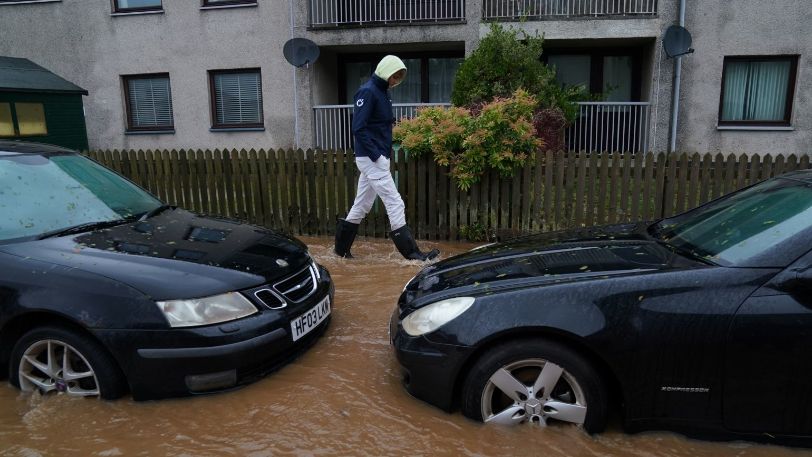Climate advisers warn of 'damaging cascading impacts'

Storm Babet led to widespread flooding in parts of Scotland
- Published
Slow progress adapting to the effects of climate change will put Scotland at increasing risk, advisors warn.
The Climate Change Committee (CCC) has raised "serious concern" over the "damaging cascading impacts" from severe weather.
It highlights insufficient plans for protecting water supply with gaps in drought resilience and reducing leaks.
The Scottish government said it would consult on a new set of adaptation plans in January.
The criticism comes from the committee's second progress report into how Scotland is adapting to the impacts of climate change.
It highlighted the significant flooding experienced last month from Storm Babet and last year's record breaking summer temperatures.
The report said heatwaves and heavy rainfall are being made more intense by climate change and that those recent weather extremes highlight the urgency with which climate adaptation must be addressed.
Chris Stark, CCC chief executive, said: "Progress on adapting to climate change remains too slow.
"While there have been some notable steps forward on policy, this isn't being matched in the delivery and implementation of adaptation measures in Scotland."
The committee added that the Scottish government's new plan must "drive real improvements" which prepare Scotland for the changes in the climate.
Net-zero secretary Mairi McAllan said the climate emergency was not a distant threat
The average global temperature has already risen by about 1.2C since the start of the industrial revolution with its impact already being felt on our weather systems.
On Monday, UN Secretary-General Antonio Gutteres accused world leaders of a failure of leadership in tackling global warning.
Ahead of the latest climate change talks in Dubai, he urged countries to go further in reducing greenhouse gas emissions which caused the planet to warm.
But even if the globally agreed target is met, to limit warming to 1.5 - 2C, the impacts of climate change will still be felt.
WWF Scotland said it was not surprised progress was slow.
Ruth Taylor, the group's agriculture and land use policy manager, said: "The recent storms, heavy rainfall and flooding have been a wake-up call that we must take urgent action now.
"We know that those managing the land are already feeling the effects of climate change.
"We need to see support from the Scottish government for more farmers to adopt nature-friendly farming practices to support food security, reduce emissions and adapt to increasing climate change pressures.”
The Scottish government has insisted it is taking action to make Scotland more resilient to the changing climate including investing £42m per year managing flood risks.
Net-zero secretary Mairi McAllan said: "We know the climate emergency is not a distant threat - it is with us today.
"Storms have battered Scotland in recent months and 2023 is set to be the hottest year on record. The impacts of climate change are affecting families, communities and businesses across Scotland."
She thanked the committee for its report and said its recommendations will play an important role in shaping future adaptation plans.
The report concludes that there have been several "notable" steps forward on adaptation policy over the past 18 months but that "important gaps remain."
It said the overall progress on adapting to climate change has been slow, particularly when it comes to implementation of policies.
And it said the new plan, due in the new year, must ensure there are "quantified targets" for climate resilience with a "clear ownership" of delivery.
Related Topics
- Published16 November 2023
- Published31 October 2023
- Published9 October 2023